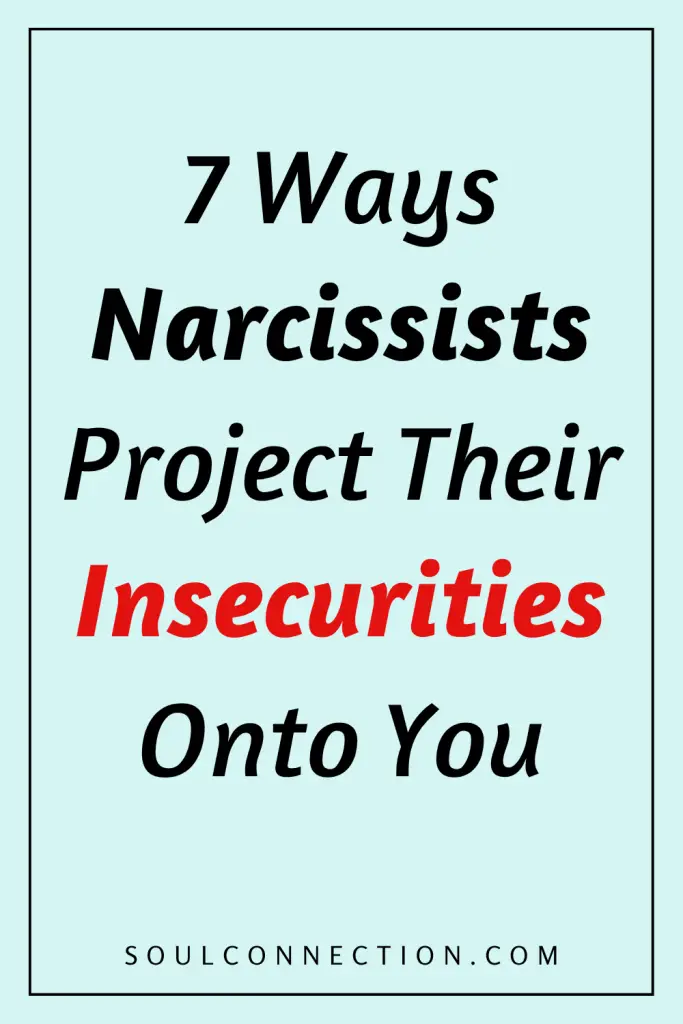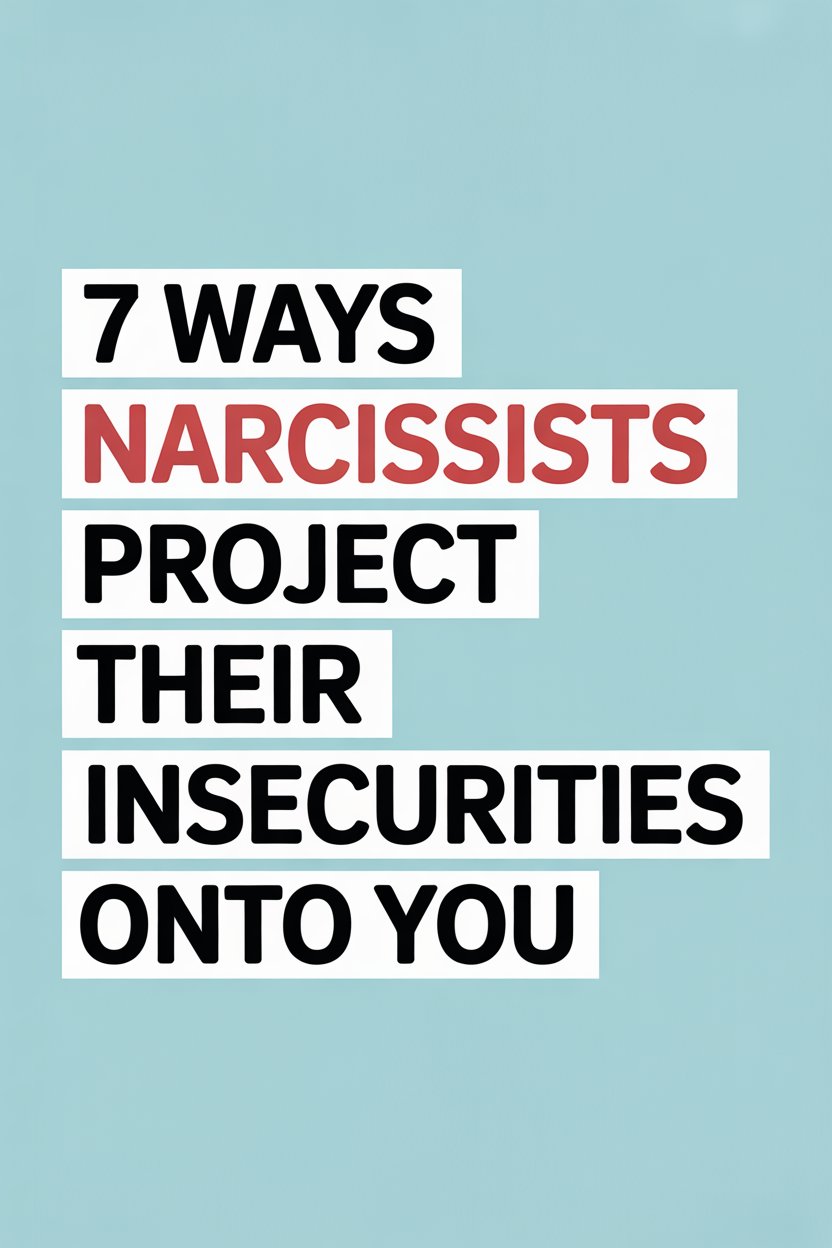Ever had an argument where you left wondering if you were the villain in a movie you didn’t audition for?
Welcome to the world of narcissistic projection, where someone else’s baggage is artfully tossed into your lap—and they expect you to thank them for the privilege.
Time to get wise to the tricks. Let’s shine a mildly judgy flashlight on seven ways narcissists throw their insecurities onto everyone else, and what you can do about it.
1. Playing the Blame Game
If you’ve ever been accused of something completely out of left field—often delivered with Oscar-worthy indignation—congratulations, you’ve experienced projection.
Narcissists have an uncanny ability to assign blame as if it were a game of hot potato. Only, in their world, potatoes are radioactive and you’re always the one left holding the bag.
Did they forget your anniversary? Suddenly, you’re the one who’s “forgetful” or “inconsiderate.” Did they raise their voice? Magically, you’re “aggressive” or “unstable.”
Narcissists hurl their own flaws at you like confetti at a parade, avoiding self-reflection the way a toddler avoids broccoli.
How to deal? Keep a mental log of what’s real and what’s borrowed from their imagination. Facts are your best friends. When accusations fly, pause and ask yourself, “Whose insecurity is this, really?” Spoiler: It’s rarely yours.
2. Accusing You of Manipulation
Ever noticed how a narcissist will call you “controlling” for wanting to pick the restaurant? Or say you’re “gaslighting” for having a different memory of Wednesday night’s argument—one that doesn’t feature their mysterious amnesia?
This is classic projection. They’re the ones twisting reality, but they’ve got the nerve to act like you’re an evil genius plotting their emotional demise.
If you’re feeling accused of mind games when all you did was suggest tacos over pizza, you’re not losing your marbles.
Spot the pattern. When accusations of manipulation pop up, check if they’re actually reacting to their own behavior. Holding your ground and calmly clarifying your intentions can stop this maneuver from throwing you off balance.
3. Criticizing Your Confidence
Narcissists can’t handle someone else’s self-esteem. If you walk into a room with your head held high, don’t be surprised if the narcissist starts poking holes in your confidence, questioning your intelligence, or mocking your achievements.
This isn’t constructive feedback; it’s a smoke bomb. Deep down, narcissists feel threatened by what they lack—so, naturally, they try to convince you that you’re arrogant, delusional, or “full of yourself,” all while hiding their own shaky egos.
Your best defense? Keep shining. Compliments don’t require an apology. Celebrate your wins, big and small. And when the critique comes, imagine it bouncing right off your metaphorical force field.
4. Turning Innocent Questions Into Accusations
Planning to ask your partner how their day was? Prepare for a full courtroom drama. Narcissists often get suspicious over the most innocent questions, as if you’re launching a covert investigation instead of just making conversation.
Why? Because they’re the ones with things to hide or unresolved guilt bubbling beneath the surface. You ask, “Who was that texting you?” and suddenly you’re “paranoid” or “distrustful.”
Meanwhile, they’re projecting their own secretive behavior onto you faster than you can say, “It was just a question.”
Keep your questions clear and direct. Refuse to let them twist your curiosity into an indictment. You’re not a detective; you’re a human being trying to connect.
5. Insisting You’re “Too Sensitive”
Feel hurt after a cutting comment? Welcome to the magical world where your emotions are apparently the problem, not the fact that someone just verbally drop-kicked you.
Narcissists can’t tolerate emotional discomfort, so they’ll claim you’re “overreacting,” “too sensitive,” or “can’t take a joke.” This isn’t about your ability to process a light ribbing—it’s about their inability to handle accountability.
Don’t buy into it. Allow yourself to feel what you feel. If their words sting, that’s not a character flaw; it’s a normal human response. Boundaries are not optional extras—they’re essential.
6. Projecting Their Jealousy Onto You
Narcissists tend to get twitchy around your friendships, hobbies, or any activity that isn’t about them. Instead of owning up to their jealousy, they’ll flip the script and claim you’re the possessive or controlling one.
Did you spend a night out with friends? Suddenly you’re being accused of abandoning or ignoring them.
Mention a new work friend? Now you’re “trying to make them jealous,” even if you were just telling a story about someone who said your lunch looked nice.
This redirection isn’t random—it’s an attempt to mask their own insecurities and keep you on the defensive. Trust your gut. Healthy relationships don’t come with constant accusations.
7. Playing Victim When Called Out
Try holding a narcissist accountable, and watch as they transform into the world’s most misunderstood martyr. Point out a pattern or gently request a change, and suddenly they’re the one suffering.
Tears, outrage, or tragic sighs—whatever it takes to redirect the spotlight.
This isn’t a genuine plea for understanding; it’s an elaborate stage show designed to dodge responsibility. You end up apologizing for having needs, while they bask in the glow of victimhood.
Don’t let the performance sway you. Stick to the facts, use “I” statements, and resist the urge to backpedal. Empathy is wonderful, but your feelings matter too.
Why It Feels So Personal
Narcissistic projection is confusing because it’s designed to be. When someone keeps tossing their insecurities your way, it can start to feel like you genuinely are the problem.
The truth? Their projections say everything about them—and nothing about your worth.
Awareness is your shield. Recognizing the signs is the first step to not absorbing their emotional static as your own.
How to Take Back Your Power
Notice the patterns. Keep track of what’s yours and what’s theirs. Ground yourself in reality, and don’t be afraid to set boundaries—yes, even if they roll their eyes so hard you worry about their optic nerves.
Reach out to trusted friends for a reality check. If you find yourself doubting your own perceptions, chances are the projection is working as intended.
Talking it through with someone objective can help you spot what’s actually happening.
Therapy isn’t just for “fixing” the relationship—sometimes it’s for learning how to protect your sanity.
If chronic projection has left you second-guessing yourself, a good therapist can help you rebuild confidence and spot emotional manipulation a mile away.
Not Your Circus, Not Your Monkeys
Living with narcissistic projection is like starring in a play where the script keeps changing and you’re never allowed to see the next page.
But here’s the plot twist: you’re allowed to walk offstage.
Remind yourself that your reality is valid. Your boundaries are nonnegotiable. And no matter how creatively someone tries to make their issues your own, you’re not responsible for cleaning up their emotional mess.
The spotlight looks much better when you’re standing in it, not ducking behind someone else’s insecurities.
Be kind to yourself. You’re not overreacting—you’re waking up. And that’s something to be proud of.


